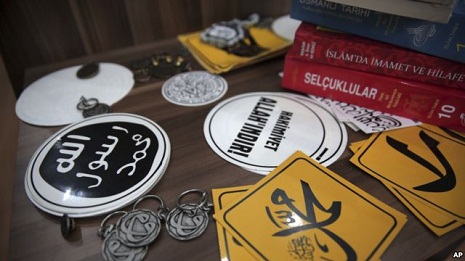The detention order issued by a court in the town of Van followed the arrests over the weekend in several provinces of 19 police officers. The court ordered that 12 of those arrested should remain in custody on charges of being members of a crime organization and for engaging in illegal wiretapping.
The detained officers had been investigating al-Qaida recruitment and smuggling activity in Turkey, including arms shipments bound for rebels in northern Syria. Border police allege the shipments are orchestrated and protected by members of Turkey’s military intelligence service, MIT, on the orders of Ankara.
Mehmet Resat Bozkurt, a lawyer acting for the detained police officers, later complained to reporters of procedural shortfalls, saying the judge saw little of the evidence submitted to exonerate the policemen. “Although our documents comprised five dossiers, the judge started the hearing after just an hour of examination of the documents,” he said.
Longstanding allegations
There have been longstanding allegations that Turkish intelligence has been channeling weapons to jihadist groups - or helping with the transportation of weapons to Syria. Turkish leaders have denied aiding jihadists fighting Syrian President Bashar al-Assad, who Erdogan is seen as committed to overthrowing. In a spat with reporters during a visit to Sweden in late 2013, Erdogan denied there were any foreign jihadists in Turkey and angrily demanded journalists offer proof.
Some proof appeared to be unearthed in January 2014 when Turkish military police intercepted an arms shipment after a tip-off prompted a pursuit of three trucks bound for Syria. The police stopped the convoy between Kіrіkhan and Reyhanlі in the southern province of Hatay. A significant amount of ammunition and weapons were discovered, but the governor of the province ordered the release of the trucks.
The investigation into jihadist activity in Turkey isn’t the only case to prompt the wrath of the government. Scores of policemen and prosecutors have been arrested, demoted or reassigned over their roles in a 2013 probe into corruption allegations leveled against senior officials in the government and close associates of President Erdogan, who was prime minister when the corruption probe was mounted. The graft accusations threatened to engulf the government and derail Erdogan’s subsequent run for the presidency.
Part of a plot
Erdogan insists the graft probe and other embarrassing cases such as the investigation into jihadist activity in Turkey are part of a plot hatched by unnamed foreign powers in league with followers of exiled Turkish Islamic scholar Fethullah Gülen, a one-time ally of the Turkish president. Erdogan has accused the influential cleric of trying to set up a “parallel state” to rival his government and alleges Gülenists have infiltrated state institutions, mainly the police and judiciary, with the aim of mounting a coup.
Earlier this month Ankara`s chief prosecutor indicted 54 Gülen movement members on charges of illegal wire-tapping, forging official documents, violation of privacy, recording personal data and slander. Most of the suspects were police or government officials. This week, the two prosecutors who oversaw the 2013 corruption probe, Celal Kara and Muammer Akkas, were charged in an Ankara court with “malpractice” and the judge who oversaw the corruption investigation has been indicted for “negligence.”
The wide-ranging 2013 probes focused on businessmen close to the government and four Cabinet members, who all resigned after the news of the allegations broke.
Crackdown expected to intensify
Observers warn, with June elections looming, the crackdown on dissent is expected to intensify. Newspapers and organizations seen as being close to Gülen, who is in self-imposed exile in the U.S., have borne the brunt of the government’s ire. In December, the editor of one of Turkey’s top-selling newspapers, Zaman, was arrested on conspiracy charges. That arrest, along with the arrest of more than a dozen other journalists, triggered criticism from rights groups and the European Union.
Hours before presiding over a meeting of the country’s National Security Council, Erdogan gave notice of his determination to crack down on opponents, especially those he deems members of the Gülen movement. Speaking to reporters on board a plane returning to Turkey from an official visit to Kuwait, Erdogan said his government will step up efforts to re-shape the bureaucracy and state institutions by introducing more radical measures against the “parallel structure.”
“They will respect state authority or will perish,” he said.
His remarks were condemned as inflammatory by Turkish rights groups. “Politicians should be wary of using threatening words when making statements to the public. Their statements might be exaggerated by their supporters,” warned Günal Kursun, president of the Human Rights Agenda Association (İHGD) and a law professor.
“When it was said that the ‘parallel structure will perish,` this statement resonates differently with a [certain] segment of society who might use violence against the targeted group,” added Kursun.
Opposition lawmaker Celal Dincer, a member of the Republican People`s Party, warned that Erdogan “sees himself as a sultan.”
More about:
















































